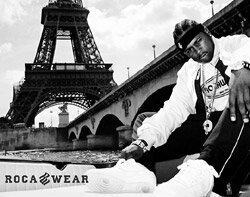 |
 |
 |
|
|
||||||||||||
|
|
||||||||||||
| Email Article | Printable Page |
Sales Suggest Hip-Hop Clothing Lines May Stick Around
 |
Many believe that hip-hop artists' clothing lines are a fad, but the revenue they produce annually suggests otherwise.
The NPD Group, a New York-based market information company, reports sales of hip-hop clothing for 2002 at $2 billion. This estimate includes not only apparel, but footwear and accessories.
Jennifer Lopez's line, J.Lo, racked up $130 million in sales last year, according to news reports. Rocawear, founded by Jay-Z and entrepreneur and music producer Damon Dash, and Baby Phat, founded by Russell Simmons, each earned $300 million. P. Diddy's Sean John line brought in $450 million last year.
Simmons' Phat Farms was sold to the Kellwood Co. for an estimated $140 million in cash and a share of future revenue, it was announced Jan. 8.
"It is a growing industry because so many different rappers and celebrities are coming out with lines, and street wear is very popular," said an NPD Group representative.
Up Against The Wall, a 16-unit urban-wear chain based in Washington, D.C., carries many of the popular hip-hop artists' clothing lines, including Rocawear, Sean John, J. Lo, Phat Farm and Baby Phat.
Izzy Ezrailson, president of the chain, said that Rocawear brings in the store's highest sales, with more than $2 million annually. Sean John comes in second, with about $1 million in annual sales.
Yet Ezrailson said he believes many of the hip-hop lines will not be around long. "There are about 40 or 50 (clothing lines) in total and they will not all last. I don't think people will always follow what some entertainer tells them to wear as a general rule," explained Ezrailson. He said he does see longevity in Rocawear and Sean John, however.
Some do not share Ezrailson's sentiment.
Aba Bonney-Kwawu, founder of the Aba Agency, a D.C. company whose services include image development and fashion consulting, said hip-hop artists' clothing lines are not a fad. "It's going to be a mainstay. It's like their music and fashion go hand in hand, but it's just going to evolve depending on the way the rap and the music evolve."
Some Howard University students say they will eventually grow out of this style of dress.
"Ten years from now, we will not be wearing them," said Brandon Brice, a junior international business major. Lines such as Sean John and Rocawear are too trendy and do not have the universal appeal of such mainstream clothing lines as Ralph Lauren, he said.
Many enjoy the fashion of hip-hop artists, but believe that they should not be worn exclusively.
"There's nothing wrong with wearing clothing lines that are based on hip-hop artists, but you should not be limited to them just because he or she is your favorite artist," said Kwame Mbalia, a junior biology major. "I think you should not follow the trend. If you see something you like . . . that might be Kenneth Cole or Tommy Hilfiger . . . then you should wear it."
More hip-hop clothing lines are appearing every day. Eve released her Fetish line this fall, clothing described as sophisticated and urban.
Beyonce Knowles, who has gained much acclaim in the hip-hop world with her solo album, "Dangerously in Love," is starting a line with her mother, who designs most of her wardrobe.
Jamie Ross, creative director of the youth division at Donegar Group, a New York-based fashion consulting firm, said that hip-hop is making an impact on mainstream clothing lines.
"Many mainstream clothing lines look to street fashion for ideas, such as Dolce & Gabana. Gap has joined Madonna and Missy Elliot," explained Ross, "The subculture has become the main culture."
Still, some do not believe that a true sense of fashion is behind hip-hop artists' clothing lines.
"They are based solely on the star power of who is behind it, there is no real fashion involved," said Jeremiah Mcfarlan, a junior information systems major at Howard University.
Beverly Ramsey, who has been designing formal wear since 1998, said that Sean John is closer to couture than others because of its collection of men's suits.
Hip-hop is also affecting the styles of luxury designers. "A lot of 'ghetto' people had never heard of Moskino . . . until Lil' Kim or Biggie Smalls," explained Bonney-Kwawu. "Chanel and these luxury designers are now having to make clothing to suit this new, black customer who maybe wasn't raised on it, but they're O.D.-ing on it right now."
Posted Jan. 19, 2004
In Student Life
To Sag or Not to Sag: Which Arguments Hold Up?
Students Seeing Increase in Birth Control Prices
| Home | News | Sports | Culture | Voices | Images | Projects | About Us Copyright © 2007 Black College Wire. Black College Wire is a project of the Black College Communication Association and has partnerships with The National Association of Black Journalists and the Robert C. Maynard Institute for Journalism Education. |